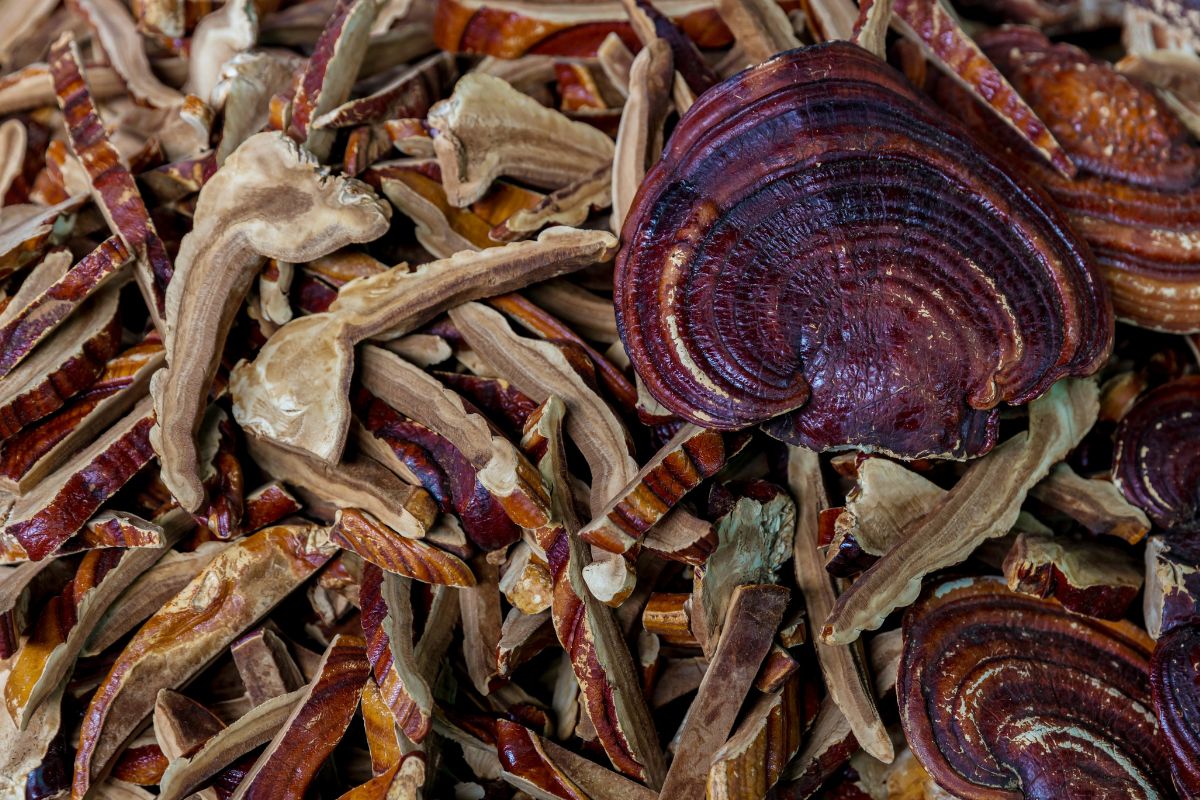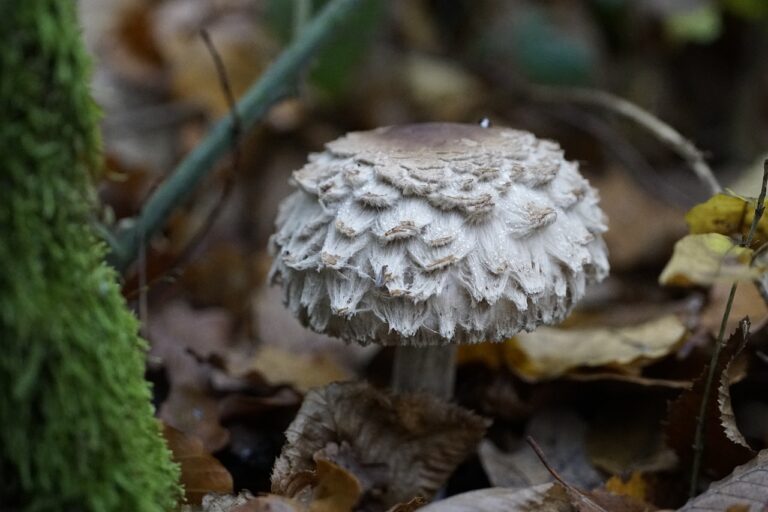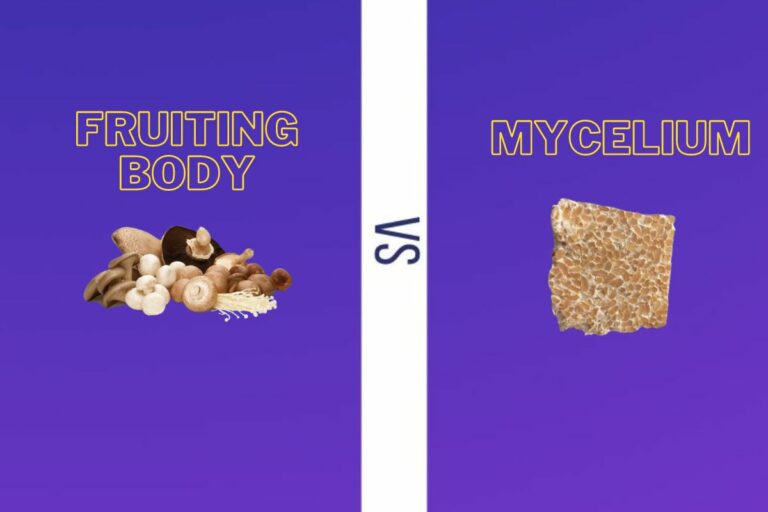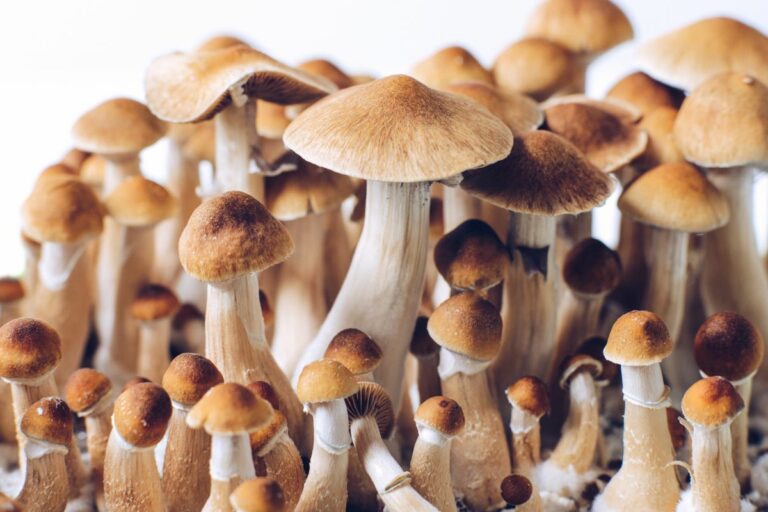Reishi mushrooms, scientifically known as Ganoderma lucidum, have long been valued for their numerous health benefits in traditional Chinese medicine. These medicinal mushrooms are known to possess immune-boosting, anti-inflammatory, and antioxidant properties, making them an attractive addition to one’s wellness routine. In recent years, the use of dried Reishi mushrooms has gained popularity due to their versatility and ease of storage.
Preparing and incorporating dried Reishi mushrooms into daily diets can be a simple and enjoyable process. This article offers guidance on how to make the most of these potent fungi, providing valuable insights into the different methods of consumption and potential therapeutic effects. By the end of this read, a deeper understanding of Reishi mushrooms and their benefits will be achieved, encouraging the integration of these ancient medicinal treasures into modern lifestyles.
It is important to note that while Reishi mushrooms offer numerous health advantages, it is essential to consult with a healthcare professional before incorporating them into a dietary regimen, particularly for those with pre-existing medical conditions or on medications. As with any supplement, moderation and proper usage are vital in order to experience the full potential of dried Reishi mushrooms.
What is Reishi Mushroom
Table of Contents
| Characteristic | Description |
|---|---|
| Scientific Name | Ganoderma lucidum |
| Common Names | Reishi Mushroom, Lingzhi Mushroom |
| Appearance | Shiny, reddish-brown cap with a woody stem |
| Habitat | Often found growing on hardwood trees, worldwide |
| Culinary Use | Bitter taste and tough texture, not commonly used in cooking |
| Medicinal Uses | Traditional use in Chinese and Japanese medicine for immune support, stress reduction, and overall well-being |
| Active Compounds | Ganoderic acids, polysaccharides, triterpenoids, and other bioactive compounds |
| Health Benefits | Potential immune modulation, anti-inflammatory effects, and antioxidant properties |
| Commercial Forms | Available as extracts, capsules, teas, and tinctures |
| Safety and Precautions | Generally considered safe, but consult a healthcare professional before use, especially if taking medications |
Reishi mushroom, scientifically known as Ganoderma lucidum, is a well-regarded medicinal mushroom with a long history in traditional Chinese medicine. Often referred to as the “mushroom of immortality,” this fungus is commonly used for various health-promoting purposes.
The Reishi mushroom is a polypore fungus that typically grows on tree trunks or branches in damp, wooded areas. It is characterized by its kidney or fan-shaped, shiny and varnished appearance, which can vary in color from red to black. There are multiple species of Ganoderma mushrooms, but Ganoderma lucidum is the most widely used and studied one for its medicinal properties.
Reishi mushroom is known for its immune-boosting effects, as it contains numerous bioactive compounds, including triterpenoids, polysaccharides, and peptides. These active components are believed to provide a wide range of health benefits such as promoting calmness and relaxation, supporting liver health, and providing antioxidant effects.
Besides being available as dried mushroom, Reishi can also be found in various forms like powders, capsules, extracts, and teas. Its versatility and long-standing reputation have made Reishi one of the most highly valued medicinal mushrooms in contemporary and traditional practices alike.
In summary, Reishi mushroom is a cherished medicinal mushroom with a rich history and numerous reported health benefits. Ganoderma lucidum is the most well-known and researched species of this genus, commonly used to support overall health and well-being.
Health Benefits of Reishi Mushroom
| Health Benefit | Description |
|---|---|
| Immune Support | Contains bioactive compounds that may enhance the immune system, helping the body defend against infections. |
| Stress Reduction | Acts as an adaptogen, helping the body manage stress and anxiety, potentially improving overall well-being. |
| Anti-Inflammatory | Contains antioxidants that may reduce inflammation, potentially benefiting conditions like arthritis. |
| Antioxidant Properties | Rich in antioxidants, Reishi mushrooms may protect cells from oxidative damage, supporting overall health. |
| Cardiovascular Health | Some research suggests Reishi may help lower blood pressure, reduce cholesterol levels, and support heart health. |
| Liver Health | May have hepatoprotective properties, supporting liver function and detoxification processes. |
| Cancer Support | Preliminary studies indicate potential anti-cancer properties, with research focusing on its role in cancer prevention and treatment. |
| Sleep Improvement | Reishi’s calming effects may promote relaxation and improve sleep quality for better rest. |
| Allergy Management | Some evidence suggests it may help alleviate allergy symptoms and support respiratory health. |
| Antiviral Properties | Research has explored Reishi’s potential in inhibiting certain viruses, although more studies are needed. |
| Neuroprotective Effects | Emerging research suggests Reishi’s role in protecting brain cells and potentially improving cognitive function. |
| Anti-Aging Properties | Due to its antioxidant content, it may contribute to healthy aging by reducing the impact of oxidative stress. |
| Digestive Health | May support digestive function by promoting a balanced gut microbiome and aiding in digestion. |
| Anti-Anxiety | The adaptogenic qualities of Reishi may help reduce anxiety and promote a sense of calm and relaxation. |
| Pain Management | Some individuals report reduced pain and improved pain tolerance when using Reishi supplements. |
Reishi mushrooms, known for their potential medicinal properties, have been used traditionally as a natural remedy in many Asian countries. This powerful fungus is believed to offer numerous health benefits, which may include improving immune function, reducing fatigue, and promoting heart health.
One of the major advantages of Reishi mushrooms is their ability to support the immune system. As a natural adaptogen, it helps improve immune function and reduce inflammation. Some studies suggest that Reishi mushrooms exhibit anti-inflammatory and anti-cancer properties, which can potentially help alleviate symptoms of asthma and reduce the risk of developing certain types of cancer.
Stress and anxiety management is another potential benefit of incorporating Reishi mushrooms into one’s diet. The adaptogenic properties of this potent fungus may help reduce anxiety and support overall mood, making it an excellent supplement for coping with daily stressors. Additionally, Reishi mushrooms are believed to improve sleep quality, thereby reducing fatigue and promoting relaxation.
Reishi mushrooms also contribute to better heart health. Studies have shown that the consumption of these fungi may help lower cholesterol levels, reducing the risk of heart disease. Moreover, the antioxidants found in Reishi mushrooms protect the body from oxidative stress, which is a major contributor to the progression of heart disease.
In addition to supporting immunity and heart health, Reishi mushrooms are also known for their potential cognitive benefits. Some research indicates that regular consumption of Reishi mushrooms can promote cognition and memory by reducing inflammation and improving antioxidant status.
Many people compare Reishi mushrooms to other medicinal mushrooms such as shiitake and chaga for their contributions to longevity and overall health. While each mushroom has its unique benefits, Reishi mushrooms stand out for their well-documented history of use in promoting better health, immunity, and stress relief.
In summary, incorporating dried Reishi mushrooms into your daily routine may provide numerous health benefits, from improving immune function and supporting heart health to reducing stress and enhancing cognitive abilities. While further research is needed to fully understand the extent of Reishi mushroom’s potential health benefits, adding this powerful fungus to your diet is worth considering in pursuit of optimal well-being.
How to Use Dried Reishi Mushroom
| Use | Description |
|---|---|
| Medicinal Teas | Dried Reishi slices or powder can be steeped in hot water to make a health-promoting tea. |
| Tinctures and Extracts | Dried Reishi is used as a primary ingredient in tinctures and extracts for medicinal purposes. |
| Supplements | Ground Reishi mushroom powder is encapsulated or used to create dietary supplements. |
| Culinary Applications | Dried Reishi can be ground into a fine powder and used as a flavorful seasoning in cooking. |
| Traditional Medicine | In traditional Chinese medicine, dried Reishi has been used for centuries to promote health. |
Dried reishi mushrooms offer various health benefits and can be incorporated into your daily routine in many ways. One popular method of consumption is turning them into a powder. To do this, grind the dried mushrooms using a blender or grinder. Once you have the reishi powder, it can be added to smoothies, soups, or as a seasoning in a variety of recipes.
Another common way to use dried reishi mushrooms is by brewing them into a tea. To make reishi tea, simply simmer the dried mushrooms in water for about 20-30 minutes. Strain the liquid, and enjoy the warm, soothing beverage. You can also use reishi tea as a base for other recipes, such as soups and stews.
For those who prefer a more concentrated form, reishi extracts are available. These can come in the form of tinctures or capsules. The recommended dosage for extracts varies, so be sure to follow the manufacturer’s guidelines. One popular product for consuming reishi extracts is the daily 10 tincture by Mushroom Revival. It combines reishi with nine other beneficial mushrooms for a comprehensive supplement.
When using dried reishi mushrooms, remember that moderation is key. Integrating them into your diet through various methods, such as powder, tea, or extracts, can help you reap their health benefits while avoiding overconsumption. By following these tips, you can confidently incorporate dried reishi mushrooms into your daily routine for a natural boost to your health and well-being.
Potential Side Effects of Reishi Mushroom
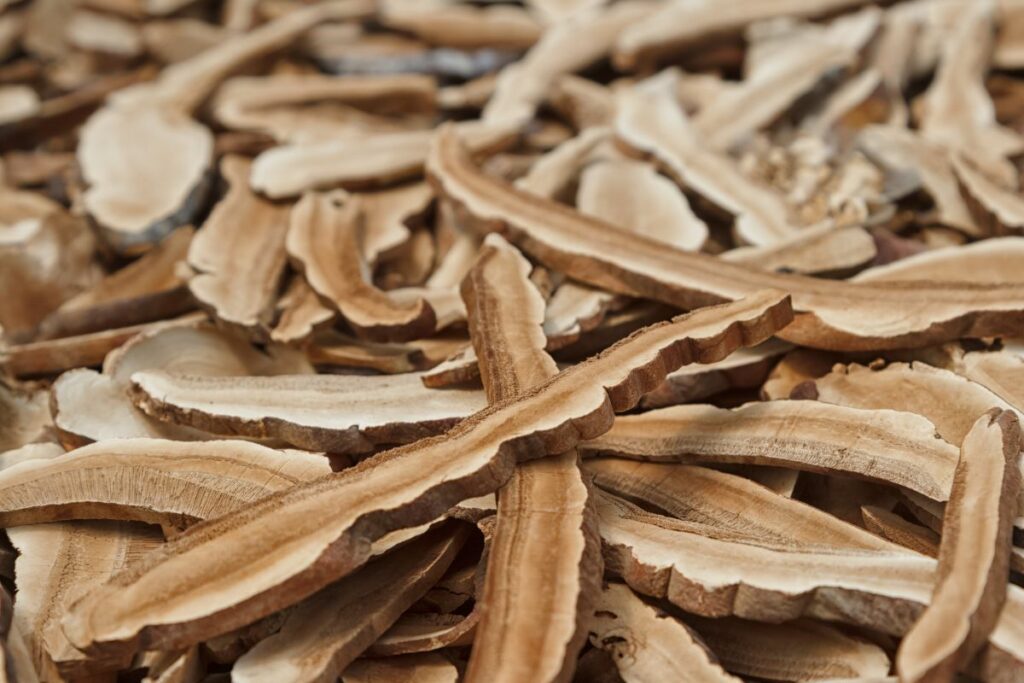
Reishi mushroom, also known as Ganoderma lucidum, is a popular supplement used for its potential health benefits. While it is generally considered safe for most people, there may be some potential side effects that one should be aware of before incorporating it into their daily routine.
- Allergic Reaction: Some individuals may experience an allergic reaction to reishi mushroom, characterized by symptoms such as rash, itchiness, and dizziness. If you suspect an allergic reaction, it is essential to discontinue use and consult a healthcare professional.
- Stomach Upset: Consumption of reishi mushroom may cause stomach upset in some people, especially when taken in large quantities. To minimize this risk, it is advised to start with a small dose and gradually increase it over time.
- Low Blood Pressure: Reishi mushroom might lower blood pressure levels in some individuals. If you have low blood pressure or are taking medication to lower your blood pressure, consult a healthcare professional before using reishi mushroom, as it may cause your blood pressure to drop too low.
- Bleeding: There have been some reports of reishi mushroom influencing blood clotting, potentially increasing the risk of bleeding in individuals with bleeding disorders or those taking blood-thinning medications. It is essential to consult a healthcare professional before using reishi mushroom if you fall into these categories.
- Nosebleed: A less common but still possible side effect of reishi mushroom is nosebleeds. If you notice frequent nosebleeds after starting to take reishi mushroom, discontinue use and consult a healthcare professional.
- Liver Damage and Liver Toxicity: While rare, cases of liver damage have been reported due to the use of reishi mushroom. Symptoms may include fatigue, nausea, and jaundice. It is important to ensure that you are consuming a high-quality product, as contamination or poor processing practices may increase the risk of liver toxicity. If you have liver disease or are at risk for liver problems, it is advised to consult a healthcare professional before using reishi mushroom.
In conclusion, although reishi mushroom is widely used and considered safe for most people, it is crucial to be aware of potential side effects. Always consult a healthcare professional before introducing any new supplement into your daily routine, especially if you have pre-existing health conditions or are taking medication.
Interactions with Medications
Dried reishi mushrooms have been used traditionally for their array of health benefits. However, it’s important to be cautious when using them alongside certain medications. Reishi mushrooms may interact with medications prescribed for high blood pressure, blood sugar control, and other health conditions.
People taking medications for high blood pressure should be cautious when adding reishi mushrooms to their diet. Reishi has been known to interact with these medications, potentially causing blood pressure to drop too low. As a result, it is crucial to speak with a healthcare professional before consuming reishi mushrooms alongside blood pressure medications.
Similarly, reishi mushrooms could impact blood sugar levels, making it necessary for individuals using medications for blood sugar control to exercise caution. Reishi mushrooms may lower blood sugar levels, which may lead to a dangerous decrease in blood sugar when used in conjunction with diabetes medications. Again, it is highly recommended to consult with a healthcare professional before incorporating reishi mushrooms into one’s diet if taking medications for blood sugar control.
Moreover, reishi mushrooms may interact with conventional medications in general, making it essential to be aware of potential interactions. While it’s important to recognize these possible interactions, remember that not all individuals may experience adverse effects. The best course of action, as always, is to consult with a knowledgeable healthcare professional before making any changes to one’s diet or medication regimen.
In conclusion, it’s crucial to be mindful of potential interactions between dried reishi mushrooms and medications, especially those for high blood pressure and blood sugar control. To ensure safety and maximize the potential benefits of reishi mushrooms, seeking advice from a healthcare professional is always the most prudent approach.
Safe Dosage Recommendations for Reishi Mushroom
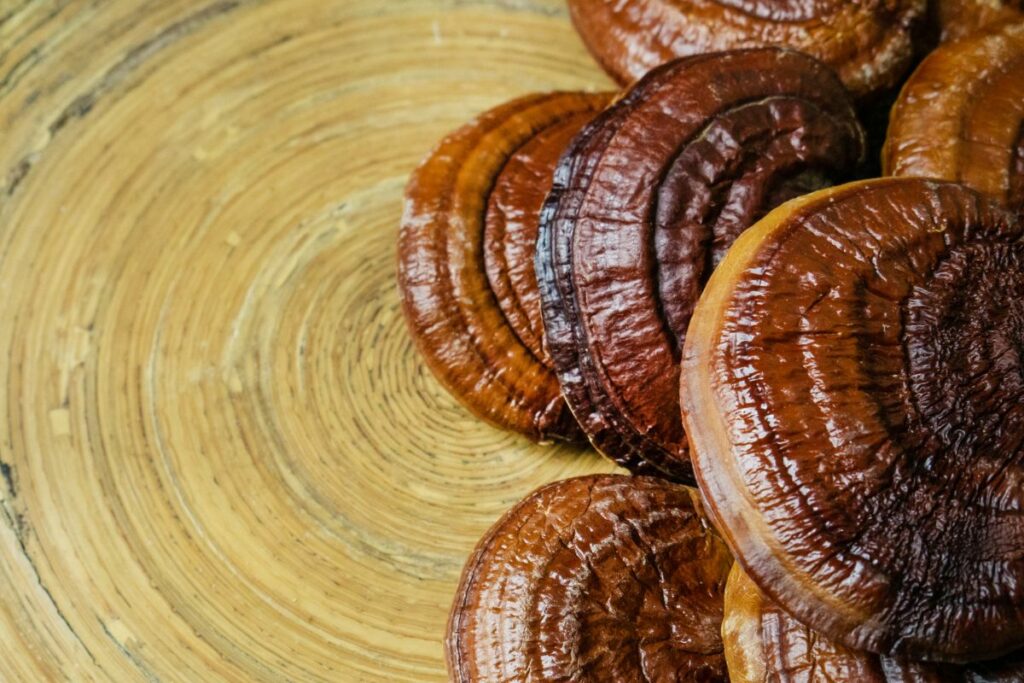
Reishi mushrooms, scientifically known as Ganoderma lucidum, have traditionally been used for various health benefits. When consuming dried Reishi mushrooms or supplements, it’s important to follow safe dosage recommendations to ensure optimal efficacy and minimize the risk of side effects.
One of the primary active compounds in Reishi mushrooms are triterpenes, which are responsible for the herb’s bitter taste and various health benefits. Polysaccharides, especially beta-glucans, are another group of compounds found in Reishi mushrooms that contribute to their potential immune system benefits1. To ensure that you consume an adequate amount of these beneficial compounds, it is important to follow proper dosage guidelines.
The dosage of dried Reishi mushrooms or supplements varies depending on their quality and the desired effect. A typical recommended starting dose for Reishi mushroom powder is 1800 mg daily2. This can be divided into three 600 mg doses throughout the day. As individual reactions to Reishi mushrooms may differ, some people may need to adjust their dosage to a higher or lower amount to achieve the desired effect.
When Reishi mushrooms are consumed as extracts or in specialized formulations, the dosage recommendations may differ. For example, standardized Reishi mushroom extracts containing a specific percentage of triterpenes and polysaccharides will have different dosage instructions compared to non-standardized products. It is crucial to follow the manufacturer’s instructions on the product label.
When using Reishi mushrooms for the first time, it’s advisable to start with a lower dose to observe any possible side effects or adverse reactions. Common side effects may include dry mouth and nose, itchiness, or stomach upset3. If these symptoms occur, consider reducing the dose or discontinuing use and consulting with a healthcare professional. It is important to note that pregnant or nursing women, individuals with medical conditions, or those taking medications should consult their healthcare provider before using Reishi mushrooms.
In conclusion, always refer to the dosing guidelines provided by the product manufacturer, considering that they may differ based on the type and concentration of active compounds present in the specific Reishi mushroom product. Monitoring your body’s response and seeking professional guidance is recommended to ensure safe and effective use of dried Reishi mushrooms or supplements.
Buying and Storing Reishi Mushroom
Purchasing high-quality dried Reishi mushrooms is important to ensure you receive the maximum benefits of these powerful fungi. Look for reputable suppliers, either online or in your local health food stores. Reishi mushrooms are typically available in the form of whole dried fruiting bodies, powder, or as extracts. Supplements containing Reishi mushrooms are also popular, but choosing the right product requires some research.
When buying dried Reishi mushrooms, examine their appearance carefully. High-quality Reishi mushrooms have a hard, woody texture and are usually dark brown in color. Pay attention to the spores, which are crucial in determining the mushroom’s potency. A high spore count indicates a potent Reishi mushroom.
Storing your dried Reishi mushrooms correctly is essential to maintain their efficacy. Keep the Reishi mushrooms in an airtight container to prevent them from absorbing moisture from the air. Store the container in a cool, dry place away from direct sunlight, as heat and humidity can cause the mushrooms to deteriorate.
To prolong the shelf life of your Reishi mushrooms, consider freezing them. Keep the mushrooms in a sealed plastic bag, ensuring that they are dry before you place them in the freezer. Freezing protects the mushrooms’ active ingredients, ensuring that they remain stable and effective during storage (*source).
By following these guidelines for buying and storing your dried Reishi mushrooms, you can ensure that you have access to a potent and powerful natural remedy when needed. Always remember to consult with your healthcare practitioner before using Reishi mushrooms, as their potency may not be suitable for everyone.
Reishi Mushroom in Traditional Medicines
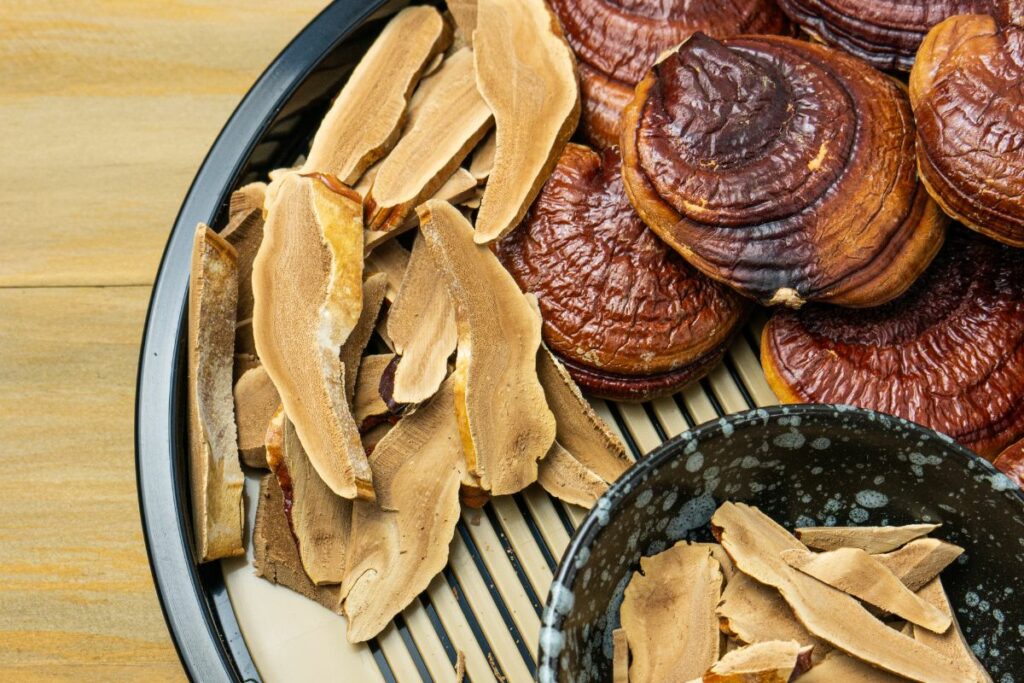
Reishi mushrooms, scientifically known as Ganoderma lucidum, have a long history of use in Traditional Chinese Medicine (TCM) as well as in Japan. The fungi are commonly referred to as Ling Zhi, meaning “spirit plant” or “mushroom of immortality” in China, while in Japan, they are known as Reishi or “Auspicious Mushroom,” highlighting their significance in both areas of traditional medicine.
In China, Reishi mushrooms have been used for over 2000 years as medicinal herbs. They have been recorded as a potent remedy in the oldest Chinese pharmacopeia, the “Shennong Ben Cao Jing,” which dates back to the Han Dynasty. The mushrooms are believed to provide various health benefits, including promoting longevity, enhancing immunity, and improving overall wellness. Emperors in ancient China often reserved the use of Reishi mushrooms for themselves and their royal courts, associating the fungus with good health, wealth, and fortune.
In Japan, Reishi mushrooms have been an essential part of their traditional medicine, called Kampo, for centuries. The fungus has been featured in the Japanese Cornelian cherry pharmacopeia, “Honzo wamyo,” which was written in 918 AD. Just like in China, the Reishi mushrooms were highly valued for their potential health benefits and were often used by samurais to combat fatigue and increase strength during battles.
Many of the traditional uses for Reishi mushrooms are now supported by modern scientific research. The fungus has been found to contain various bioactive compounds, such as triterpenes, polysaccharides, and steroids, which can contribute to several health benefits. Some studies have demonstrated the effects of Reishi mushrooms on the immune system, antioxidant activity, and anti-inflammatory properties. Additionally, Reishi mushrooms have been investigated for their potential therapeutic effects on chronic diseases such as cancer, diabetes, and liver disorders.
To sum up, Reishi mushrooms have been an essential part of traditional medicine in both China and Japan for centuries. With their potential health benefits and rich history, the fungus continues to be a topic of interest and research in the modern medical field.
Reishi Mushroom Recipes
| Recipe | Description |
|---|---|
| Reishi Mushroom Tea | A simple and traditional preparation. Steep dried Reishi slices or powder in hot water for a soothing tea. Add honey or lemon for flavor. |
| Reishi Mushroom Broth | Make a flavorful and nutritious broth by simmering dried Reishi with other vegetables and seasonings. Use it as a base for soups and stews. |
| Reishi Mushroom Risotto | Incorporate rehydrated dried Reishi slices into a creamy mushroom risotto for a rich and earthy flavor. |
| Reishi Mushroom Stir-Fry | Add sliced fresh or rehydrated dried Reishi to a stir-fry with vegetables, tofu, or meat for an umami-packed dish. |
| Reishi Mushroom Sauce | Create a savory sauce by blending rehydrated dried Reishi with garlic, herbs, and olive oil. Use it as a pasta or steak sauce. |
| Reishi Mushroom Powder Smoothie | Blend Reishi mushroom powder with fruits, yogurt, and honey for a nutritious and energizing smoothie. |
| Reishi Mushroom Capsules | Fill empty capsules with Reishi mushroom powder for a convenient way to incorporate it into your daily routine. |
| Reishi Mushroom Omelette | Sautee sliced fresh or rehydrated dried Reishi with eggs, cheese, and herbs to make a hearty mushroom omelette. |
| Reishi Mushroom Salad | Add thinly sliced fresh Reishi to a salad for a unique texture and earthy flavor. Pair with a vinaigrette dressing. |
| Reishi Mushroom Tincture | Prepare a Reishi tincture by soaking dried Reishi in alcohol for several weeks. Use it as a concentrated supplement. |
Reishi mushrooms are known for their potential health benefits and unique flavor. Dried reishi mushrooms can be incorporated into various dishes, allowing consumers to enjoy the benefits while also savoring delicious meals. Here are a few ways to use dried reishi mushrooms in your recipes.
A popular way to include reishi mushrooms into one’s diet is by making a comforting reishi tea. To prepare the tea, break the dried reishi mushroom into small chunks and add them to boiling water. Simmer for about 30 minutes to an hour, allowing the flavor to release. To enhance the taste, add some ginger to the mixture. Once the tea is ready, strain and serve. For a creamier version, consider adding milk of your choice.
Another option is to incorporate reishi mushrooms into a hearty soup or stew. Start by rehydrating the dried mushrooms by soaking them in hot water for 30 minutes to an hour. After that, drain the mushrooms, keeping the soaking liquid to add to the dish later for extra flavor. In a soup pot, sauté onions, garlic, and ginger, then add the rehydrated mushrooms, vegetables of your choice, and the reserved mushroom liquid. Simmer for at least an hour to allow flavors to meld and enhance each other.
Reishi mushrooms can also be mixed into grain dishes, such as rice or quinoa. To do this, first rehydrate the mushrooms as mentioned earlier. Next, sauté your choice of vegetables and seasonings, before adding the mushrooms and grains. Cook until the grains are fully cooked, and the dish is well-seasoned, adjusting the flavors accordingly.
However, it is essential to be aware of the possible risks associated with reishi mushroom consumption. Some individuals may face allergies or digestive issues when consuming reishi mushrooms. It is always advised to consult your healthcare provider before adding any new ingredient to your diet.
In summary, dried reishi mushrooms offer versatility in enhancing dishes’ flavors and providing potential health benefits. By incorporating them into teas, soups, and grain dishes, one can enjoy a flavorful and comforting meal while potentially reaping the rewards of this ancient ingredient.
Frequently Asked Questions
How do I prepare dried reishi as a tea?
To prepare dried reishi mushroom as a tea, first, break or slice the dried mushroom into small pieces. Next, add these pieces to boiling water and let them simmer for about 30-60 minutes. After simmering, strain the mixture to remove the solid mushroom particles. The resulting liquid is your reishi mushroom tea. You may add honey or other natural sweeteners to enhance the taste, but it’s not necessary.
What is the proper dosage for dried reishi daily?
The proper dosage for dried reishi can vary depending on factors such as age, health, and usage purpose. Generally, a daily dosage of 3-5 grams of dried reishi mushroom is recommended for maintaining good health. However, it’s always best to consult a healthcare professional or an expert in traditional medicine before incorporating reishi into your daily routine.
Are there any side effects from consuming dried reishi?
Reishi mushrooms are considered safe for most people when consumed as a food or supplement. However, some individuals may experience side effects such as upset stomach, dizziness, skin rash, or a dry mouth. If you’re taking medications or have underlying health conditions, it’s wise to consult with a healthcare professional before using dried reishi.
Can I use dried reishi in cooking recipes?
Yes, dried reishi mushrooms can be used in various cooking recipes, such as soups, stews, and sauces. Its earthy, bitter taste lends unique flavors to the dish. However, bear in mind that reishi is quite tough, so it’s best to cook it for an extended time before consuming it. You may also pre-soak it in water to help soften it before adding it to your recipes.
What is the shelf life of dried reishi mushrooms?
When properly stored in a cool, dry place away from direct sunlight and moisture, dried reishi mushrooms can last up to one year or even longer. If you notice any signs of mold or a change in scent or texture, it’s time to dispose of the dried reishi and purchase a new batch.
How do I identify reishi mushrooms before drying?
Reishi mushrooms, also known as Ganoderma lucidum, can be identified by their distinct appearance. They usually have a reddish or orange, shiny, and somewhat waxy cap with a woody texture. The underside of the cap features small pores instead of gills, which release spores. Collecting wild mushrooms is not recommended for beginners as misidentification may occur. It’s best to purchase your dried reishi from reputable suppliers or cultivate them yourself to ensure their quality.
Footnotes

